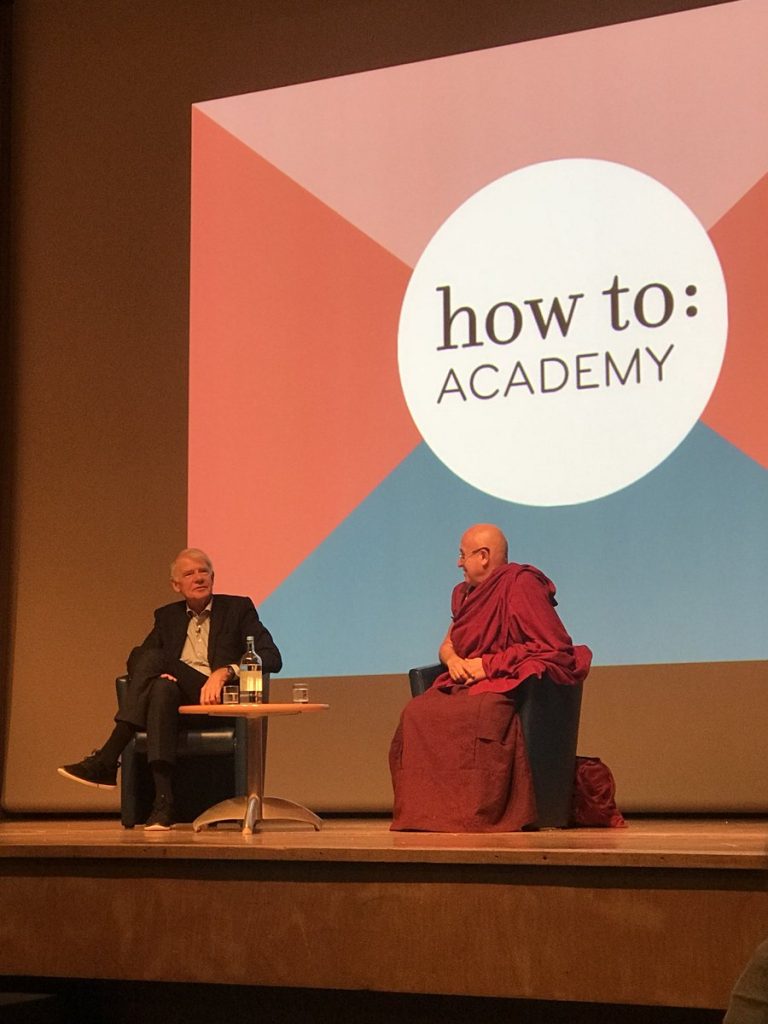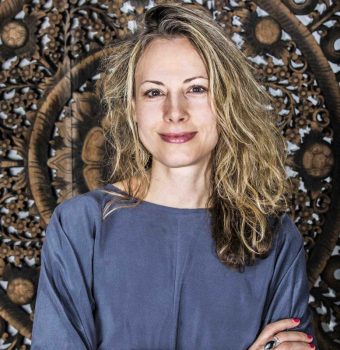
On Tuesday 30th of January 2018, at a talk hosted by the How To Academy in London, Mathieu Ricard – French biologist and Buddhist monk – and Wolf Singer – neuroscientist, spoke about the intersection between Buddhism and neuroscience, a topic explored by the book “Beyond the Self: Conversations between Buddhism and Neuroscience”
Below are some key points from the conversation (not quotes!)
On the self:
- MR: Imagine the self as a dynamic stream. It is ever changing.
- WS: In the West, through therapies, we want to a more resilient ego, a more peaceful, cooperative being. We believe that you have to have a strong ego, in order to turn the other cheek. But in Buddhism, the ego is considered bad.
- MR: Yes but in Buddhism there is a concept of responsibility. It’s not that there is no excuse, because there is no self… You still have a sense of responsibility.
- MR: A strong person in Buddhism is someone who is free, because they are not swayed by external things such as gain or loss, pleasure or pain. This strength enables us not to be so self protective, and more able to be there for others, because we are strong, because we are free, not swayed by external factors
- MR: The root of suffering is grasping, craving, attraction and repulsion. Health is the silencing of these. A healthy self is the silent self.
On our perception of reality:
- WS: Do we perceive reality as it is?
- WS: In modern neuroscience, which is evidence-based, we know that what we perceive is the result of a sophisticated reconstruction exercise based on huge amounts of information in the brain.
- WS: When you are born, you have the full reservoir of neurons, and as we grow and develop the process of neural pruning happens through education, and our intersection with the world.
- WS: The reason we see the world in a similar way is because we have a similar architecture in the brain. However different cultures have different architectures. If stored information differs, perceptions of reality differ.
- WS: Cultural difference create different perceptions of reality.
- WS, MR: Buddhism is like a science, because it involves the rigorous investigation of our minds. It is a contemplative science.
- MR: You never perceive reality in the same way or at the same time because everything is perpetually changing.
- MR: All mental and physical phenomena are interdependent and impermanent.
- MR: The main cause of suffering is the misperception of reality. You need to see the things the way they are: impermanent, changing from one minute to the next. Don’t superimpose and distort reality based on your perception. Buddhists try to identify the deepest cause of suffering.
- MR: The real issue is not the person who is momentarily angry, but anger itself.
On transforming the mind
- WS: As an adult you cannot change the architecture, but rather the connections/synapses.
- MR: We vastly underestimate the power of transformation of our mind. But we need to deal with it from morning until night. And we still have a tendency to look outside of ourselves.
- MR: If we can train ourselves to remain joyful and compassionate etc… in the face of adversity.
- MR: We have to influence our view of the outside world to make it as good as possible, but it can still be over-powered by the mind! The mind can suddenly change.
- MR: The quality of our experience moment to moment is the result of our mental approach.
- MR: Thoughts lead to emotions. The accumulation of emotions leads to moods. The accumulation of moods changes our traits.
- MR: We have to painstakingly manage thought after thought, emotion after emotion, mood after mood, and then we slowly change.
- MR: Neuroscience shows us that the brain changes when we play chess, or learn maths. Buddhism/contemplation we learn to build inner transformation to better serve the world, ourselves, and others.
On meditation and mindset
- WS: Consciousness is the primordial fact. All sentient beings are inhabited by consciousness.
- WS: You can reach the point of pure awareness, without mental construction.
- WS: Meditation is an active process that needs to be worked at, and requires concentration and effort.
- WS: Every learning experience is characterised by a thickening of the part of the brain that is engaged.
- WS: Tanya Singer [his daughter, also a neuroscientist] has done research into the effects on the brain of different types of meditation.
- Mindfulness meditation increased awareness and concentration, but not necessarily pro-social behaviour
- Loving kindness meditation increased prosocial behaviour
- WS: Every type of meditation has a different signature in the brain. Everything we do repeatedly changes the brain.
- WS: The mindset is hugely important.
- For instance, in research the effect of mindset on cleaners, if they thought of their work as promoting physical fitness, they actually lost weight, their blood pressure went down, and they were happier than if they didn’t think of their work in those terms.
- Our mindset has a profound influence on our body, physiology, and mental health
- WS: Three months of mindfulness meditation has been shown to boost the immune system, lower stress, etc…
